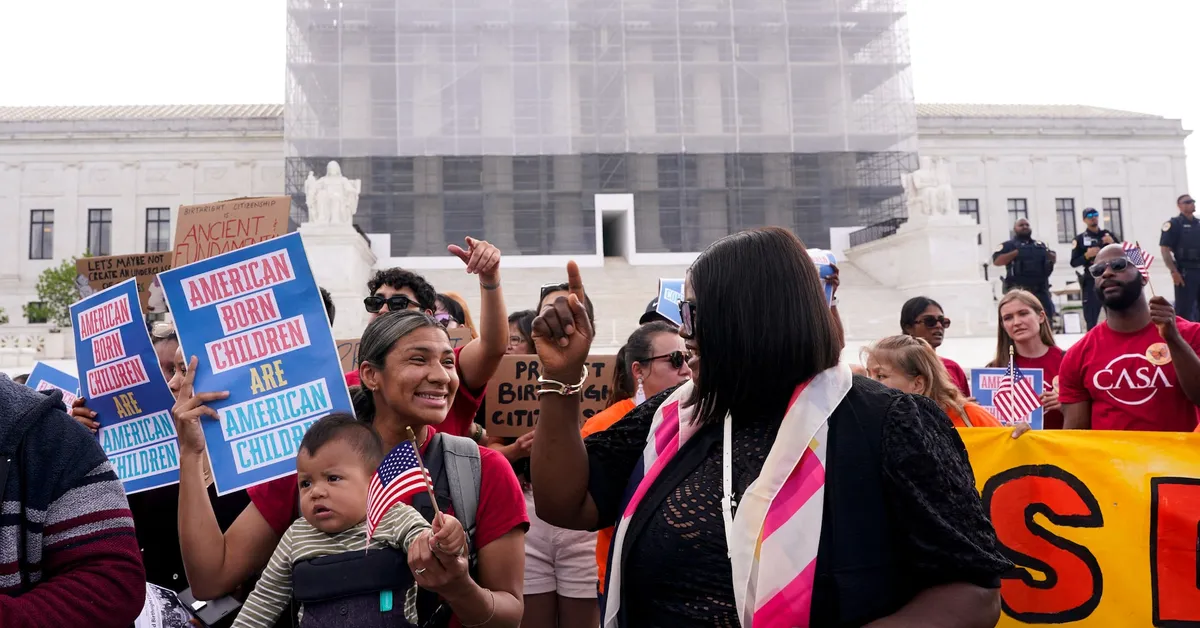
Concord, New Hampshire — On July 10, a federal judge issued a significant ruling preventing President Donald Trump's administration from denying citizenship to certain babies born in the United States. This decision came in response to a lawsuit filed by immigrant rights advocates, who sought class action status to protect children at risk of losing their citizenship due to Trump's executive order, which aims to limit birthright citizenship.
U.S. District Judge Joseph Laplante made his ruling during a hearing in Concord, New Hampshire, after advocates urged the court to recognize the potential harm posed by the implementation of Trump's directive. This executive order, signed on Trump's first day back in office, has been controversial and faces ongoing legal challenges. Judge Laplante paused the ruling for seven days to allow the Trump administration the opportunity to appeal, which a Justice Department lawyer indicated would likely occur.
The American Civil Liberties Union (ACLU) lawyers argued for the ruling, especially after the U.S. Supreme Court's recent decision on June 27, which narrowed the scope of nationwide injunctions against Trump's policies. The Supreme Court's ruling implies that babies born in certain parts of the U.S. to non-citizen parents could be at risk of losing their citizenship and facing deportation. However, the ruling allows for exceptions in class action lawsuits, which can represent groups of individuals who share similar circumstances.
During the hearing, Judge Laplante expressed his firm belief that the decision to issue an injunction was clear-cut, given the serious implications of depriving children of their citizenship. He emphasized that citizenship is a fundamental privilege, stating, "It is the greatest privilege that exists in the world." The executive order was set to take effect on July 27, following the Supreme Court's ruling, making the urgency of his decision even more pronounced.
ACLU attorney Cody Wofsy praised the ruling, asserting that it would safeguard all children across the country from what he described as a "lawless, unconstitutional, cruel executive order." Meanwhile, White House spokesperson Harrison Fields criticized the judge's decision, labeling it an unlawful attempt to circumvent the Supreme Court's clear directive and claiming that it abused class action certification procedures. Fields stated that the Trump administration is committed to vigorously contesting the actions of judges they believe are obstructing the policies Trump was elected to implement.
Trump's executive order aims to instruct federal agencies to deny citizenship to U.S.-born children whose parents are not American citizens or lawful permanent residents, also known as green card holders. According to the plaintiffs in various lawsuits challenging this order, more than 150,000 newborns could face denial of citizenship annually if the order is enacted nationwide. Earlier this year, four judges, including Judge Laplante, issued injunctions blocking its enforcement, citing potential violations of the 14th Amendment of the U.S. Constitution.
The judges referenced the Supreme Court's 1898 decision in United States v. Wong Kim Ark, which affirmed the right to birthright citizenship irrespective of the immigration status of a child's parents. While three judges in Maryland, Massachusetts, and Washington issued injunctions to halt Trump's order nationwide, Judge Laplante's earlier injunction was limited to members of specific immigrant rights organizations. The Supreme Court's recent decision clarified that while judges could not issue universal injunctions, they could grant relief through class actions for similarly situated individuals.
Despite the Trump administration's claims of victory following the Supreme Court ruling, federal judges have continued to block significant aspects of Trump's policies deemed unlawful. Justice Amy Coney Barrett, who authored the Supreme Court's decision, indicated that class action lawsuits could provide a viable means for plaintiffs to seek relief similar to that of nationwide injunctions. Immigrant rights advocates quickly responded by launching proposed class actions, including the one presented before Judge Laplante, who acknowledged the complexities of issuing nationwide injunctions and expressed a preference for class action litigation.
As this legal battle unfolds, the implications of Judge Laplante's ruling will be closely monitored, as it represents a pivotal moment in the ongoing discourse surrounding immigration policy and birthright citizenship in the United States.